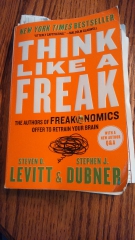
To think like a Freak means to think small, not big. (…)..many of us think we know more than we do. It has to do with something we all carry with us everywhere we go, even though we may not consciously think about it: a moral compass. Each of us develop a moral compass (some stronger than others, to be sure) as we make our way through the world. This is for the most part a wonderful thing. Who wants to live in a world where people run around without regard for the difference between right and wrong? But when it comes to solving problems, one of the best way to start is by putting away your moral compass. Why? When you are consumed with the rightness or wrongness of a given issue –whether it’s fracking or gun control or genetically engineered food –it’s easy to lose track of what the issue actually is. A moral compass can convince you that all the answers are obvious (even when they are not); that there is a bright line between right and wrong (when often there isn’t); and, worst, that you are certain you already know everything you know about a subject so you stop to learn more. (…)
Consider a problem like suicide. It is so morally fraught that we rarely discuss it in public...
(…) There are about 38,000 suicides a year in the United States, more than twice the number of homicides. Suicide is one of the top ten causes of death for nearly every age group. Because talking about suicide carries such strong moral taboo, these facts are little known. As of this writing [2014], the U.S. homicide rate is lower than it’s been in fifty years. The rate of traffic fatalities is at a historic low, having fallen by two-thirds since the 1970s. The overall suicide rate, meanwhile, has barely budged- and worse yet, suicide among 15 to 24 year-old has tripled over the past several decades.
One might think, therefore, that by studying the preponderance of cases, society has learned everything possible about what leads people to commit suicide. David Lester, a psychology professor at Richard Stockton College of New Jersey, has likely thought about suicide longer, harder, and from more angles than any other human. In more than twenty-five hundred academic publications, he has explored the relationship between suicide and, among other things, alcohol, anger, antidepressants, astrological signs, biochemistry, blood type, body type, depression, drug abuse, gun control, happiness, holidays, Internet use, IQ, mental illness, migraines, the moon, music, national-anthem lyrics, personality type, sexuality, smoking, spirituality, TV watching, and wide-open spaces.
Has all this study led Lester to some grand unified theory of suicide? Hardly. So far he has one compelling notion. It’s what might be called the "no one left to blame" theory of suicide. While one might expect that suicide is highest among people whose lives are the hardest, research by Lester and others suggest the opposite: suicide is more common among people with a higher quality of life.
"If you are unhappy and you have something to blame your unhappiness on – if it’s the government, or the economy, or something –then that kind of immunizes you against committing suicide", he says. "It’s when you have no external cause to blame for your unhappiness that suicide becomes more likely. I’ve used this idea to explain why Afro-Americans have lower suicide rate, why blind people whose sight is restored often become suicidal, and why adolescent suicide rates often rise as their quality of life gets better."
That said, Lester admits that what he and other experts know about suicide is dwarfed by what is unknown. We don’t know much, for instance, about the percentage of people who seek or get help before contemplating suicide. We don’t know much about "suicidal impulse" –how much time elapses between a person’s moral decision and action. We don’t even know what share of suicide victims are mentally ill. There is so much disagreement on this issue, Lester says, that estimates range from 5 percent to 94 percent. "I’m expected to know the answers to questions such as why people kill themselves, "Lester says. "And myself and my friends, we often -when we’re relaxing- admit that we really don’t have a good idea why people kill themselves."
(...) Learn to say "I don’t know". (…) If takes a lot of courage to admit you don’t know all the answers, just imagine how hard is to admit you don’t even know the right question. But if you ask the wrong question, you are almost guaranteed to get the wrong answer. (…) Think like a child. (…) Consider the kind of questions that kids ask. Sure, they may be silly or simplistic or out of bounds. But kids are also relentlessly curious and relatively unbiased. Because they know so little, they don’t carry around the preconceptions that often stop people from seeing things they are. When it comes to solving problems, this is a big advantage. Preconceptions lead us to rule out a huge set of possible solutions simply because they seem unlikely or repugnant; (…) because they don’t seem sophisticated enough. But remember, it was a child who finally pointed out that the Emperor’s new clothes were in fact no clothes at all. Kids are not afraid to share their wildest ideas. As long as you can tell the difference between a good idea and a bad idea, generating a boatload of ideas, even outlandish ones, can only be a good thing. When it comes to generating ideas, the economic concept of "free disposal" is key. Come up with a terrible idea? No problem- just don’t act on it. (….) So when it comes to solving problems, channeling your inner child can really pay off. It all starts with thinking small.